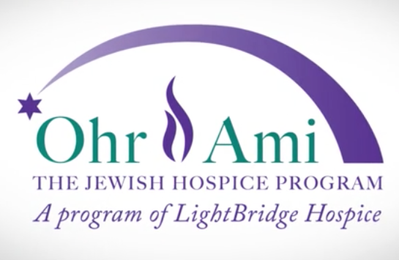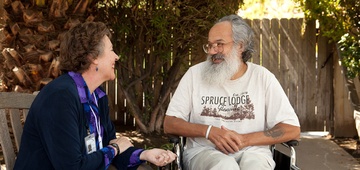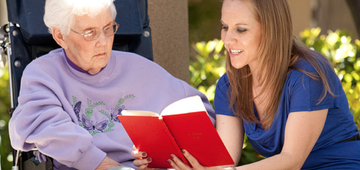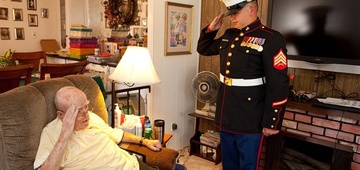
LightBridge Hospice & Palliative Care has always been committed to providing the best care possible to patients by meeting each of their specific needs. When the agency was first founded, our CEO and President, Jill Mendlen, and Senior Vice President, Pamela Hough, recognized the opportunity to better serve the Jewish hospice patients in San Diego. They met with leadership from several different organizations within the Jewish community, including the Jewish Federation of San Diego, Seacrest Village retirement community, and Jewish Family Service of San Diego. As a result of those conversations, LightBridge created Ohr Ami, San Diego’s only Jewish hospice program. The Hebrew phrase Ohr Ami means “light of my people” and the program includes the specialized hospice care typically provided by LightBridge in a way that is geared toward the unique needs of Jewish patients and their families. It enhances the spiritual care services of hospice to give patients an additional level of care and support. Every member of our staff—regardless of their discipline—receives training in the various aspects of Jewish tradition and culture that may impact the care of patients and their families. We also train our staff to recognize the wide spectrum of Jewish practice, from patients who are religiously observant to those who simply identify culturally, so that we are able to address their care with a framework of knowledge. We want our patients to know that we understand the unique Jewish rituals and needs when it comes to end of life issues. Our Ohr Ami program focuses on a variety of areas of hospice care so that we can address patient and family needs within the context of Jewish tradition and culture.
Rabbinic Direction
Even though each member of our spiritual care team is well trained in being sensitive to patients of all faiths, we’ve found that most Jewish patients prefer to have their spiritual care services provided by a rabbi—even those patients who may not be particularly religiously observant. Through Ohr Ami, we are able to have a rabbi on staff to provide this individualized spiritual care and to train all staff members and volunteers to better meet the needs of all our Jewish patients and families.
Jewish Holidays
At LightBridge, we take care to understand the impact of Shabbat (the Jewish Sabbath) and Jewish holidays and what they can mean to a patient and their family. Whether it’s enhancing their observance or being sensitive to how patients may feel about the possibility of this being the last time they’re observing that holiday, we look at holidays as potential opportunities to support our patients and provide additional enrichment. For example, on Hanukkah, our rabbi might visit patients to light candles with them, and before Rosh Hashanah he would visit a patient to sound the shofar (ram’s horn). Staff may bring special holiday foods to a client in anticipation of an upcoming holiday. We also use Jewish music to touch on the parts of their lives in which music was meaningful. These are rituals that resonate with patients—even those with memory deficits—because they trigger their long-term memory and bring the comfort of those past experiences.
Special Life Cycle Events
Unique in Jewish tradition is a young person’s achieving the age of Bar/Bat Mitzvah. We are sensitive to how this can take on particularly emotional significance when the child’s grandparent or great-grandparent is terminally ill. At Ohr Ami we address this issue with the patient and family. For instance, a Bat Mitzvah girl’s great grandparent, over the age of 100, was living in a nursing home on Ohr Ami hospice service. We worked with the patient, family and local synagogue to have the patient present at the milestone event, with the help of special medical transport. In other cases, when a patient cannot physically attend, we work diligently to make them a part of the event in an alternate way, such as having the young person rehearse his/her speech or chanting the Torah portion in advance for our patient. Sometimes we need to help the patient’s family cope with the possibility that their loved one may not live until the event.
Care for Holocaust Survivors
In addition to being trained to be sensitive to Jewish patients in general, our staff goes through special training to care for the unique needs of Holocaust survivors. We understand the psychological and emotional implications of their Holocaust experiences, so it’s very important to us that our staff and volunteers are aware of how to approach the special needs and circumstances of survivors on our hospice service.
Bereavement Support
After a patient’s death, we offer a year of bereavement support, including special mailings for Rosh Hashanah, Hanukkah, Passover, and the first yahrzeit (anniversary of the death), which is a traditional ritual observance. The mailings and follow-up are tailored to the unique rhythm of the Jewish calendar, so the patient’s family members and loved ones are supported during the specific emotionally-charged events throughout the year. Recently Ohr Ami created Jewish bereavement support groups, funded by the Jewish Hospice Fund of the LightBridge Hospice Community Foundation. In six weekly meetings, facilitated by a rabbi who is also a trained therapist, those who have sustained the death of a loved one can find a supportive environment in which to share their feelings and draw on the experiences of others. These bereavement support groups are offered as a service to the San Diego Jewish community and are open even to those whose loved one did not die while on service with LightBridge.
We are the only hospice in San Diego that has made an ongoing commitment to have a Jewish program and a rabbi on staff specifically to oversee and serve that program. Ohr Ami takes all the wonderful aspects and services of LightBridge and couples them with those designed to address the unique needs and sensitivities of Jewish patients and families. We are a team that understands the specific ways in which your Jewish identity, culture, and tradition can impact your end-of-life journey.
Contact us today by calling (858) 458-3602 or visiting us online.
By: Rabbi Ralph Dalin, Rabbinic Director, Ohr Ami - The Jewish Hospice Program



